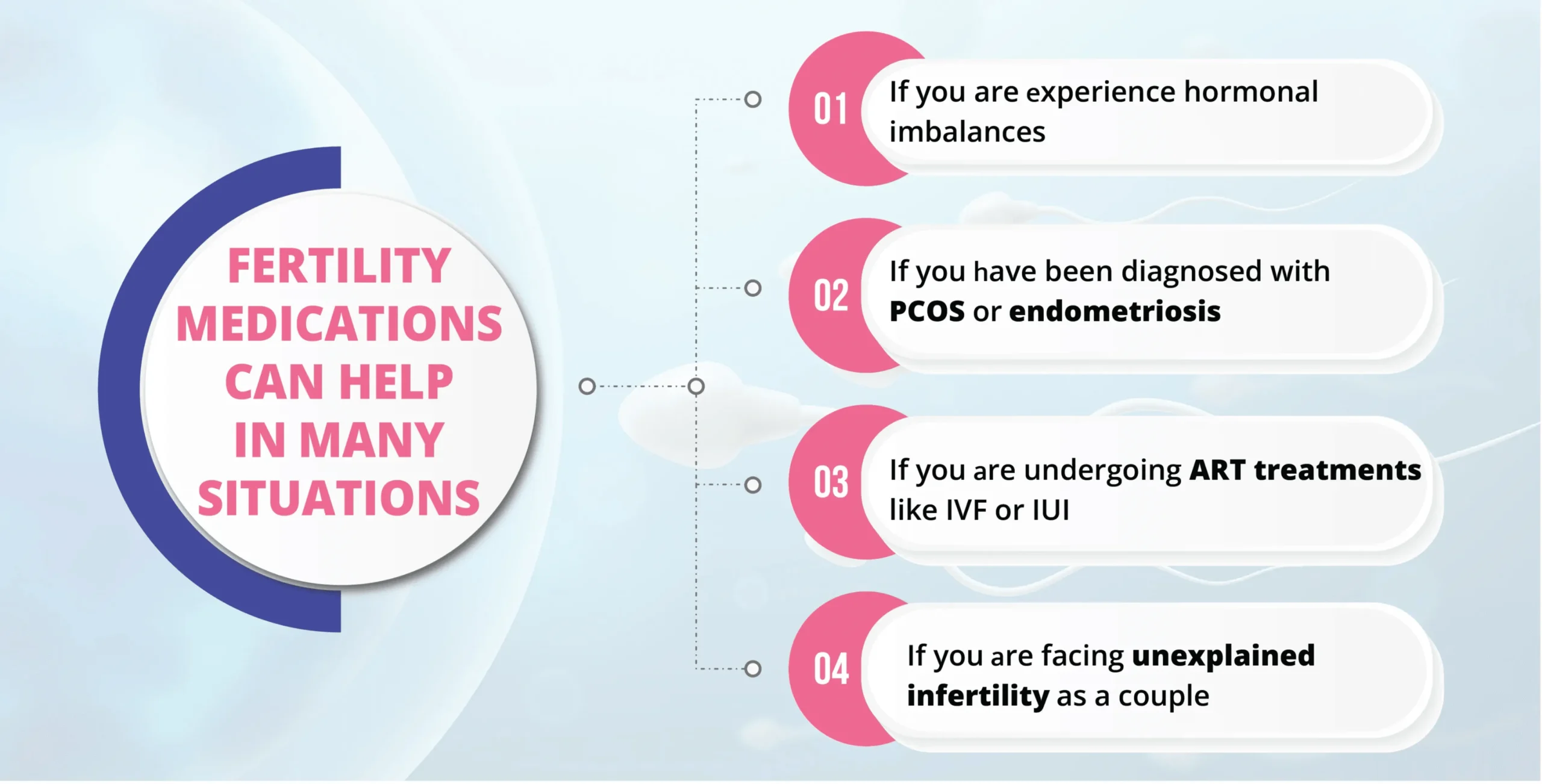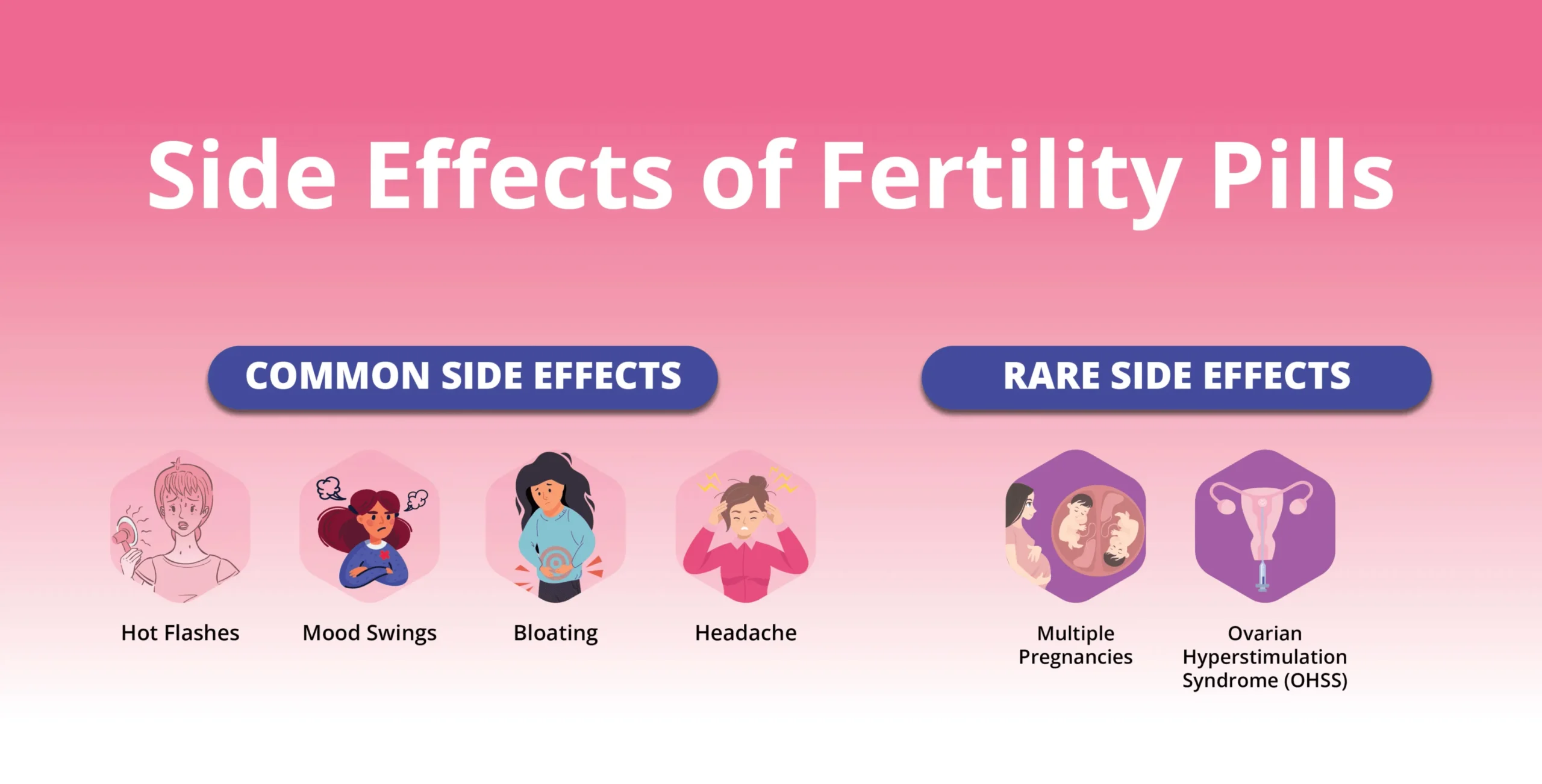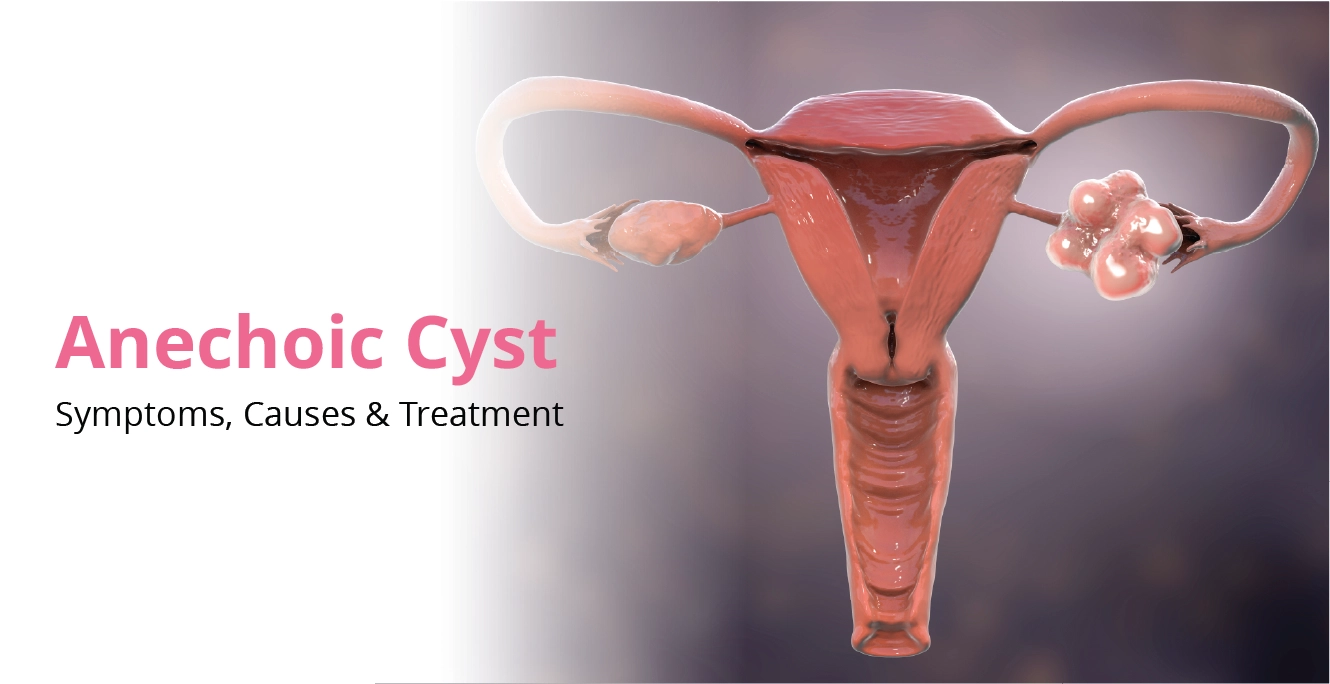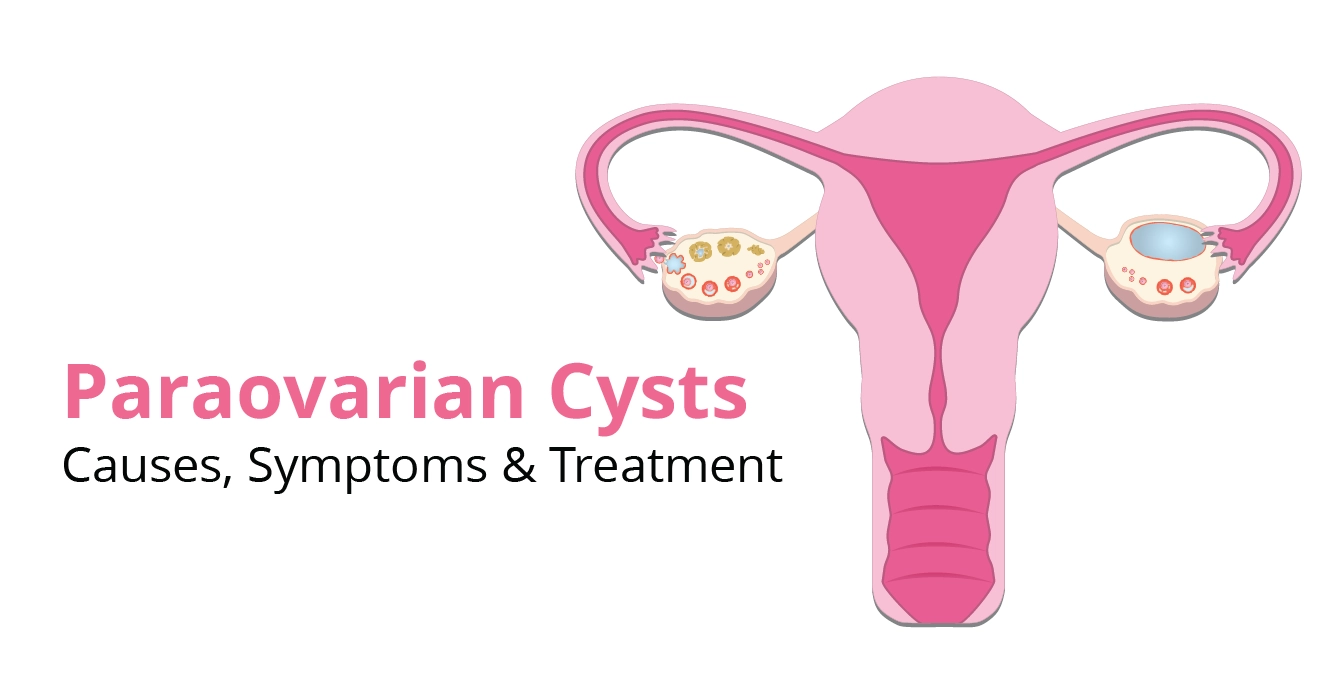
Treatments and Medicines for Infertility in Females

Table of Contents
- Quick Highlights
- Importance of Fertility Pills in Modern Medicine
- Who Can Benefit from Fertility Medications?
- What Are the Best Fertility Pills to Get Pregnant and How Do They Work?
- Types of Fertility Pills and Medications
- What is the Best Fertility Drug to Get Pregnant?
- How to Take Clomid to Get Pregnant?
- Fertility Pills for Women
- Fertility Drugs and IVF Medications
- Conception Pills and Ovulation Medications
- Medicine for Infertility: A Personalised Approach
- Side Effects of Fertility Pills and Precautions
- When to Consult a Doctor
- Frequently Asked Questions (FAQs)
- Doctor’s Note:
- Conclusion
Fertility pills and medications help couples increase their chances of pregnancy by regulating hormones and stimulating ovulation. They are especially useful for women with hormonal imbalances, PCOS, endometriosis, or those undergoing treatments like IVF and IUI. These medicines boost hormones that encourage egg production and release, making conception more likely. Common types include oral pills like Clomid and Letrozole, and injectable hormones used in advanced treatments. Along with medications, supplements like folic acid and vitamin D support reproductive health. Fertility drugs have transformed infertility care but should always be taken under medical supervision due to possible side effects. With personalized treatment and proper care, many couples can overcome fertility challenges and move closer to the joy of welcoming a newborn.
Quick Highlights
- Fertility pills or fertility medications help regulate hormones and stimulate ovulation which improves the chances of pregnancy.
- IVF medications like Gonadotropins play an important role in assisted reproductive technologies-based treatments.
- For conditions such as PCOS and endometriosis, fertility pills can be administered.
- Side effects of fertility drugs should be monitored carefully. These may include complications like OHSS (Ovarian hyperstimulation syndrome) though these are rare.
- Conception pills and supplements provide additional support for improving reproductive health.
For couples who are trying to conceive but are unsuccessful, advancements in medical science and modern medicine offer multiple solutions. From advanced reproductive techniques such as IVF and IUI to the best fertility medicines to get pregnant, there are many effective treatment options available to help those who are aspiring to become parents. Whether there is a need to regulate ovulation or stimulate egg production, fertility medicines have changed the perception towards infertility treatment. What are these medicines, how do they work and which give better results? Let’s get a deeper understanding of everything you need to know about fertility drugs or medication. Also, understand their importance in your journey to achieve parenthood.
Importance of Fertility Pills in Modern Medicine

Fertility medications serve as an important base in reproductive medicine which helps millions of people to overcome infertility issues. These treatments not only provide support for individuals who receive advanced treatments like IVF but also for those experiencing hormonal imbalance, ovulation disorders or unexplained infertility.
Who Can Benefit from Fertility Medications?

Not everyone’s path to pregnancy is straightforward, and that’s okay.
Fertility medications can help in many situations, including if you:
- Experience hormonal imbalances.
- Have been diagnosed with PCOS or endometriosis.
- Are undergoing ART treatments like IVF or IUI?
- Are facing unexplained infertility as a couple?
What Are the Best Fertility Pills to Get Pregnant and How Do They Work?
Let’s understand this in a simple way!
Fertility pills are medicines used to improve reproductive functions in females. They work by regulating or stimulating ovulation, thereby increasing the likelihood of pregnancy. How? Below is an overview.
- Hormonal imbalance is the prime culprit causing infertility. Fertility medications target the hormonal system to improve reproductive function.
- They stimulate the ovaries to produce and release eggs by boosting levels of essential hormones. These are FSH (follicle-stimulating hormone) and LH (luteinising hormone).
- Also, fertility medicines help correct hormonal imbalances that may be disrupting ovulation. This boosts the chances of conception.
Types of Fertility Pills and Medications
The following table mentions some of the best fertility medicines to get pregnant. Note: Your health should be your first priority. Do not risk it. Take medicines only when they are prescribed by your doctor.
| Medicine | How Does it Help? |
| Clomiphene Citrate (Clomid) |
|
| Letrozole (Femara) |
|
| Gonadotropins (FSH and LH Hormones) |
|
| Human Chorionic Gonadotropin (hCG) |
|
| Bromocriptine and Cabergoline |
|
What is the Best Fertility Drug to Get Pregnant?
The best fertility drug depends on the underlying cause of infertility. For most women with ovulatory issues, Clomid or Letrozole is the first-line treatment. However, for those requiring more advanced interventions, injectable gonadotropins or IVF medications may be more suitable. A fertility specialist can help tailor the treatment to your specific needs.
How to Take Clomid to Get Pregnant?
Clomid is typically prescribed in a 5-day regimen, starting on days 3, 4, or 5 of your menstrual cycle. Dosage varies but usually starts at 50 mg per day. Regular ultrasounds may be recommended to monitor ovulation and adjust dosages if necessary.
NOTE: Your doctor will prescribe you the medicine as per your health condition and requirements.
Fertility Pills for Women
Benefits of Ovulation-Inducing Medications
Ovulation-inducing medications play a vital role in overcoming fertility challenges. They:
- Regulate Irregular Menstrual Cycles: Women with irregular or absent periods often struggle with unpredictable ovulation. Fertility pills help normalise cycles by stimulating consistent ovulation, improving the chances of pregnancy.
- Stimulate the Release of Multiple Eggs for IVF: In assisted reproductive treatments like IVF, medications are used to produce multiple mature eggs, increasing the likelihood of fertilisation and embryo success.
- Address Specific Hormonal Imbalances: Conditions like PCOS or high prolactin levels can interfere with ovulation. Fertility pills restore hormonal balance, enabling regular ovulation and improving egg quality.
Fertility Supplements for Women
Alongside prescribed fertility medications, supplements play a complementary role in enhancing reproductive health. While fertility pills directly stimulate ovulation, these supplements improve overall reproductive health, making the body more receptive to conception.
- Folic Acid: Essential for preventing neural tube defects in the baby and improving overall fertility.
- Vitamin D: Supports ovarian health and enhances hormone production crucial for ovulation.
- Coenzyme Q10 (CoQ10): Improves egg quality by boosting energy production in cells and reducing oxidative stress.
Fertility Drugs and IVF Medications
Let’s learn about some of the best medicines used in fertility treatments to improve your chances of pregnancy.
Medications Used in the IVF Process
The IVF process relies heavily on fertility drugs to ensure the best possible outcomes. These medications are designed to regulate and enhance the reproductive system during the various stages of IVF treatment. Key medications include:
- Gonadotropins: These injectable fertility drugs stimulate the ovaries to produce multiple eggs in a single cycle, which is crucial for increasing the chances of successful fertilisation.
- GnRH Agonists and Antagonists: These medications prevent premature ovulation by controlling the release of luteinising hormone (LH), ensuring that eggs remain in the ovaries until the optimal time for retrieval.
- hCG Injections: Human chorionic gonadotropin (hCG) triggers the final maturation and release of eggs, perfectly timing ovulation for egg retrieval during the IVF process.
How Fertility Drugs Support Assisted Reproductive Technologies
Fertility medications are the backbone of advanced treatments like IVF and IUI. They help by:
- Enhancing Egg Production: For women with low ovarian reserve or irregular ovulation, fertility drugs stimulate the ovaries to produce more eggs, improving the likelihood of successful fertilisation.
- Regulating Hormones: Medications like gonadotropins and GnRH agonists/antagonists ensure that hormonal imbalances don’t interfere with the treatment process, creating a stable and controlled environment for conception.
- Supporting Embryo Development: Fertility pills and medications ensure that the eggs retrieved during IVF are of optimal quality, which is crucial for embryo development and implantation.
For those undergoing IVF, the right combination of fertility drugs makes all the difference in achieving successful outcomes.
Conception Pills and Ovulation Medications
Over-the-Counter Options for Boosting Fertility
While most fertility drugs require a prescription, supplements like myo-inositol and prenatal vitamins can improve reproductive health.
Prescription-Only Medications
Medications like Clomid, Letrozole and gonadotropins are only available under medical supervision due to their potency and side effects.
Medicine for Infertility: A Personalised Approach
Every individual’s fertility journey is unique, and a one-size-fits-all treatment rarely works. This is why a personalised approach matters!
Below are some of the popularly used medicines for specific conditions but remember, every patient is different, only your doctor can suggest you the best.
Infertility Pills for Specific Conditions
- Polycystic Ovary Syndrome (PCOS):
- PCOS is one of the most common causes of infertility, characterised by irregular ovulation due to hormonal imbalances.
- Letrozole: A first-line medication for women with PCOS, it lowers oestrogen levels to stimulate the release of FSH and promote ovulation.
- Metformin: Often prescribed when PCOS is linked to insulin resistance, it regulates blood sugar levels, helping restore ovulation and improve egg quality.
- Endometriosis:
- Endometriosis occurs when uterine-like tissue grows outside the uterus, leading to inflammation and reduced fertility.
- Gonadotropins (FSH and LH): These injectable hormones stimulate the ovaries to produce multiple eggs, bypassing the challenges caused by endometriosis.
- GnRH Agonists: These suppress the hormones responsible for endometrial growth, reducing inflammation and improving reproductive outcomes when combined with other treatments.
Fertility Medications for Unexplained Infertility
Unexplained infertility accounts for nearly 20-30% of infertility cases, where no clear cause can be identified despite thorough testing.
- Clomid: Often the first step in treating unexplained infertility, it stimulates ovulation and increases the likelihood of conception.
- Injectable Hormones (Gonadotropins): These are used when Clomid proves ineffective, directly stimulating the ovaries to produce eggs.
- Combination Therapies: Fertility drugs are frequently combined with procedures like intrauterine insemination (IUI) to enhance success rates.
Side Effects of Fertility Pills and Precautions

Fertility medications are generally safe and effective, but like all treatments, they can also come with some side effects. Some common and rare side effects are:
Common Side Effects
- Hot Flashes: Many women experience sudden warmth or sweating as a result of hormonal changes caused by fertility medications like Clomid.
- Mood Swings: Shifts in hormone levels can lead to irritability, anxiety, or mood changes during the treatment cycle.
- Bloating: Hormonal stimulation may cause mild abdominal bloating, especially around ovulation.
- Headaches: Changes in oestrogen levels may trigger tension headaches or migraines.
Rare Side Effects
Ovarian Hyperstimulation Syndrome (OHSS):
- A rare but serious complication where the ovaries become swollen and painful due to overstimulation.
- This can cause symptoms like severe bloating, rapid weight gain, and abdominal pain.
Multiple Pregnancies:
- Fertility pills increase the chance of releasing multiple eggs, which can result in twins, triplets, or higher-order pregnancies.
- While exciting for some, multiple pregnancies carry risks such as preterm labour or low birth weight.
When to Consult a Doctor
It is crucial to monitor your body’s response to fertility treatments and reach out to your doctor if:
- Side effects like severe bloating, pain, or persistent headaches occur.
- Symptoms of OHSS, such as difficulty breathing or rapid weight gain, develop.
- You do not conceive after 3-6 cycles of treatment, as this may require adjusting your treatment plan or exploring alternative options.
Precautions to Keep in Mind:
- Always take fertility medications under a doctor’s supervision, as dosage adjustments might be necessary.
- Maintain regular follow-ups with your fertility specialist to monitor ovulation and the effectiveness of treatment.
- Inform your doctor about any pre-existing conditions or medications you’re currently taking to avoid drug interactions.
Frequently Asked Questions (FAQs)
Are Fertility Pills Safe for Long-Term Use?
Long-term use should only be under medical supervision to minimise risks like OHSS (Ovarian Hyperstimulation Syndrome).
How Soon Can I Expect Results After Taking Fertility Pills?
Many women ovulate within the first cycle, but it may take 3-6 cycles for a successful pregnancy.
Can Fertility Medications Cause Multiple Pregnancies?
Yes, especially medications like Clomid and gonadotropins, which increase the likelihood of releasing multiple eggs.
Doctor’s Note:
Fertility medications are a cornerstone of reproductive treatments, but they should always be taken under expert guidance. Consult a fertility specialist to know the most effective and personalised treatment plan for your needs. ~ Dr. Manjunath CS
Conclusion
If you are facing fertility challenges, Remember, you are not alone—and you are not without options! Fertility medications and treatments are a game-changer for many couples who are going through infertility challenges. These have made the dream of parenthood a reality for millions of couples. All you need is the right approach and early intervention because this can open up the doors of maximum possibilities for you. If you are facing any issues related to your reproductive health, you can speak to the best fertility experts at Birla Fertility & IVF. We are here to help you!
Our Fertility Specialists
Related Blogs
To know more
Birla Fertility & IVF aims at transforming the future of fertility globally, through outstanding clinical outcomes, research, innovation and compassionate care.
Had an IVF Failure?
Talk to our fertility experts

 Our Centers
Our Centers














